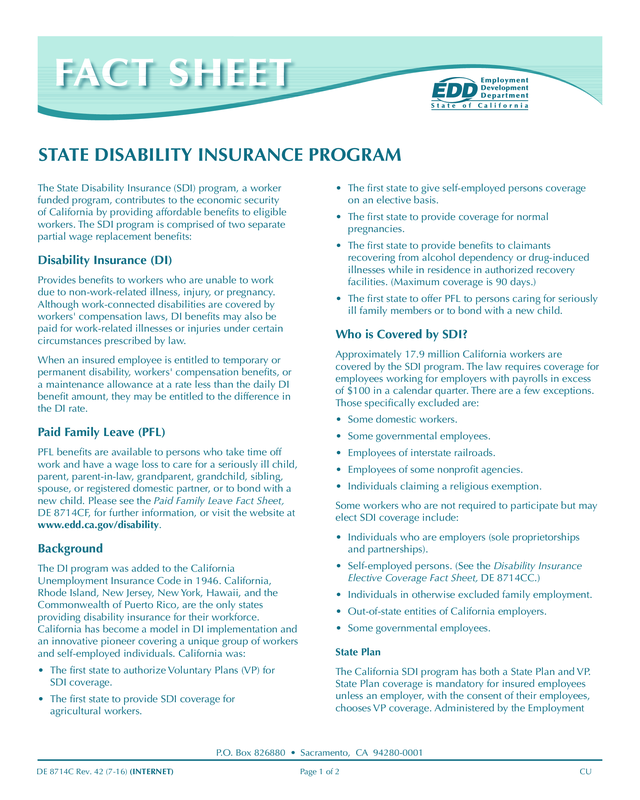Fillable Printable Sdi Program Fact Sheet (De 8714C)
Fillable Printable Sdi Program Fact Sheet (De 8714C)

Sdi Program Fact Sheet (De 8714C)

DE 8714C Rev. 42 (7-16)
(INTERNET) Page 1 of 2 CU
P.O. Box 826880•Sacramento, CA 94280-0001
STATE DISABILITY INSURANCE PROGRAM
The State Disability Insurance (SDI) program, a worker
funded program, contributes to the economic security
of California by providing affordable benefits to eligible
workers. The SDI program is comprised of two separate
partial wage replacement benefits:
Disability Insurance (DI)
Provides benefits to workers who are unable to work
due to non-work-related illness, injury, or pregnancy.
Although work-connected disabilities are covered by
workers' compensation laws, DI benefits may also be
paid for work-related illnesses or injuries under certain
circumstances prescribed by law.
When an insured employee is entitled to temporary or
permanent disability, workers' compensation benefits, or
a maintenance allowance at a rate less than the daily DI
benefit amount, they may be entitled to the difference in
the DI rate.
Paid Family Leave (PFL)
PFL benefits are available to persons who take time off
work and have a wage loss to care for a seriously ill child,
parent, parent-in-law, grandparent, grandchild, sibling,
spouse, or registered domestic partner, or to bond with a
new child. Please see the Paid Family Leave Fact Sheet,
DE 8714CF, for further information, or visit the website at
www.edd.ca.gov/disability.
Background
The DI program was added to the California
Unemployment Insurance Code in 1946. California,
Rhode Island, New Jersey, New York, Hawaii, and the
Commonwealth of Puerto Rico, are the only states
providing disability insurance for their workforce.
California has become a model in DI implementation and
an innovative pioneer covering a unique group of workers
and self-employed individuals. California was:
•TherststatetoauthorizeVoluntaryPlans(VP)for
SDI coverage.
•TherststatetoprovideSDIcoveragefor
agricultural workers.
•Therststatetogiveself-employedpersonscoverage
on an elective basis.
•Therststatetoprovidecoveragefornormal
pregnancies.
•Therststatetoprovidebenetstoclaimants
recovering from alcohol dependency or drug-induced
illnesseswhileinresidenceinauthorizedrecovery
facilities. (Maximum coverage is 90 days.)
•TherststatetoofferPFLtopersonscaringforseriously
ill family members or to bond with a new child.
Who is Covered by SDI?
Approximately 17.9 million California workers are
covered by the SDI program. The law requires coverage for
employees working for employers with payrolls in excess
of $100 in a calendar quarter. There are a few exceptions.
Those specifically excluded are:
•Somedomesticworkers.
•Somegovernmentalemployees.
•Employeesofinterstaterailroads.
•Employeesofsomenonprotagencies.
•Individualsclaimingareligiousexemption.
Some workers who are not required to participate but may
elect SDI coverage include:
•Individualswhoareemployers(soleproprietorships
and partnerships).
•Self-employedpersons.(SeetheDisability Insurance
Elective Coverage Fact Sheet,DE 8714CC.)
•Individualsinotherwiseexcludedfamilyemployment.
•Out-of-stateentitiesofCaliforniaemployers.
•Somegovernmentalemployees.
State Plan
TheCaliforniaSDIprogramhasbothaStatePlanandVP.
State Plan coverage is mandatory for insured employees
unless an employer, with the consent of their employees,
choosesVPcoverage.AdministeredbytheEmployment

Development Department (EDD), the State Plan is
financed entirely by California workers’ contributions
through their earnings.
Contributions collected go into the Disability Fund
and are used for payment of SDI benefits and program
administration.
Voluntary Plan
AVPisaprivateplanapprovedbytheDirectorofthe
EDD.ItmaybesubstitutedfortheStatePlaniftheVP
matches the State Plan’s benefits, provides at least one
greater benefit, and costs the employee no more than the
State Plan.
About 3.4 percent of California’s workers are covered by
SDIVPs.
EmployersandemployeegroupsmayestablishVPswith
mutual consent of the employer and a majority of the
employees. An employee may choose State Plan coverage
eventhoughaVPisavailablewheretheywork.
Eligibility and Benefits
DI benefits are payable when a covered employee has a
wage loss and cannot work due to pregnancy or illness/
injury not related to their job. Benefits are payable for a
maximum of 52 weeks.
To receive benefit payments, a person must:
•Fileaclaiminaccordancewithregulations.
•Serveaseven-day,non-payablewaitingperiod.
If a claim is filed for the same or related cause or
condition within 60 days of the initial claim, it will
be processed as a continuation of the initial claim for
which a waiting period was already served. There will
not be a new waiting period in such cases.
•Havebeenpaidatleast$300inwages,thataresubject
to SDI contributions, during the 12-month base period
of the claim.
•Submittoareasonablemedicalexamination,ifrequired.
•Fileacerticateofdisabilitysignedbyadulyauthorized
medical or religious practitioner.
Claims can be filed online at www.edd.ca.gov/disability
or by mail. Benefits are generally paid every two weeks.
Disqualifications
The SDI program is committed to program integrity and
will take all possible measures to detect and deter fraud
and protect the Disability Fund. No SDI payments can be
made to persons who willfully make false statements or
withhold material facts to receive benefits.
A person with a disability is also ineligible for DI benefits:
•WhenreceivingUnemploymentInsuranceorPFL
payments.
•Whenreceivingfullwages(benetpaymentsand
wages added together are limited to the total weekly
wage, excluding overtime pay, immediately prior to
the disability).
•Wheninlegalcustodyasaresultofaconvictionor
when confined by a court order.
•IfreligiousexemptionfromSDItaxeshasbeenled.
•Iftheindividualisnolongerinthelabormarket.
•Whenreceivingworkers’compensationataweekly
rate equal to or greater than the DI rate.
Appeals
All participants have the right to appeal to an impartial
Administrative Law Judge (ALJ) concerning determinations
of eligibility or benefit amounts. Further appeal from
an ALJ's decision may be filed with the California
Unemployment Insurance Appeals Board, or the Board
may set aside the ALJ's decision on its own motion.
Decisions of the Board may be reviewed by the courts.
Social Security
A person with a disability should contact the Social
Security Administration for information about benefits
under its programs. For additional information, call the
Social Security Administration at 1-800-772-1213, or
TTY 1-800-325-0778.
State Government Employees
State government employees, through a negotiated
agreement between the State of California and a
recognizedemployeeorganization,mayelectto
be covered by SDI. For information about SDI, visit
the website at www.edd.ca.gov/disability, or call
1-866-352-7675, or TTY 1-800-325-0778.
The EDD administers a separate Non-Industrial Disability
Insurance (NDI) program for State employees not covered
by SDI. For information about NDI, call 1-866-758-9768,
or TTY 1-800-325-0778.
For More Information
For additional information on the SDI program, please visit
the EDD's website at www.edd.ca.gov/disability, or call
our SDI program representatives at 1-800-480-3287 for
DI or 1-877-238-4373 for PFL. TTY users, please call the
California Relay Service at 711.
The EDD is an equal opportunity employer/program.
Auxiliary aids and services are available upon request to individuals with disabilities.
DE 8714C Rev. 42 (7-16) (INTERNET) Page 2 of 2



